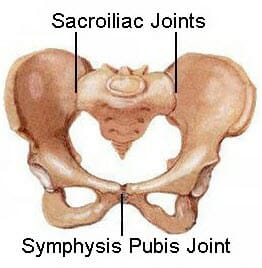Pregnancy-Related Pelvic Girdle Pain
What is Pregnancy–Related Pelvic Girdle Pain (PPGP)?
Pelvic girdle pain can arise during and after pregnancy. It is pain around the pelvic girdle, which is a number of bones, and joints that support your spine (at the top) and legs (at the bottom). The most commonly irritated and painful areas during pregnancy are the sacro-iliac and symphysis pubis joints. Discomfort is either felt in the front or the back of the pelvis. Women may also feel referral pain down the back or front of the thighs, hips, lower back or lower abdominal area.
 |
 |
What are symptoms of PPGP
The severity of discomfort can vary from person to person. Pain can range from mild to severe, where it limits one from performing their daily activities. The symptoms may present suddenly or gradually and can occur at any time during or after pregnancy. Sometimes clicking and/or grinding may be felt or heard in the pelvic area.
Symptoms may be aggravated when loading through the pelvic girdle is unbalanced in activities such as:
- Shifting or turning in bed
- Getting in/out of bed or a car
- Standing on one leg to get dressed
- Walking
- Going up or down stairs
- Getting up or sitting down in a chair
What are the causes of PPGP?
Often there is a combination of factors which lead to instability in these joints. With the changing body form in women during pregnancy, muscles also need to change; an example is the lengthening of the abdominal muscles. With these changes the joints may become more imbalanced and unstable, which can lead to excessive & or restricted movements in these joints. Another contributing factor is the changes in hormones such as relaxin which affects the ligaments in the pelvic girdle allowing for greater movements required to accommodate for the baby and delivery. Studies have shown that the motions in the pelvic girdle joints during pregnancy are 32-68% larger than when not pregnant.
How can physiotherapy help?
A physiotherapist, Cecile Röst, from the Netherlands has developed a very effect treatment technique which is targeted specifically to PPGP with extremely positive outcomes. The main goals of Röst Therapy, are for women
- To stay active and move in a natural way throughout pregnancy
- To restore normal symmetric joint mobility in the hips, pelvis and lower back
- To restore normal coordination and motor control patterns by using frequent, easy to do exercises
- To reduce anxiety and pain to a minimum
When to Book Physiotherapy for Pregnancy-Related Pelvic Girdle Pain
If you can relate to any of these symptoms we can help, please contact us at Absolute PhysioCare in Burnaby to discuss any queries or set up an appointment with a qualified therapist.
For more information, please visit one of our practitioners and we’ll be more than happy to help you get to the relief you have been searching for! Contact us at Burnaby Physio Care at 604-558-CARE (2273) or contact us online to learn more and to make an appointment.
About the Author
Nicole Yeats has a special interest in Women’s Health and is certified in the Röst Therapy technique.
